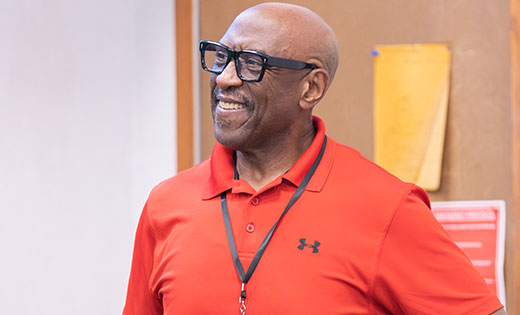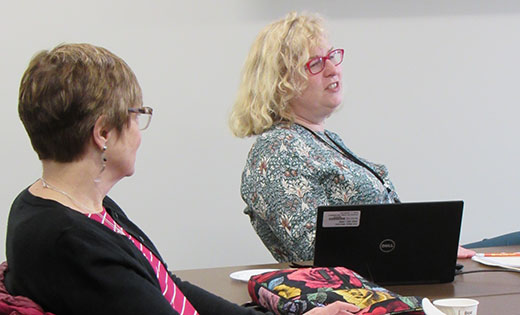Hybrid Doctor of Ministry in Reformed Theology
WHAT IS THE Reformed FOCUS LIKE?
This Doctor of Ministry focus explores the dynamics of ministry in the cultural contexts of Scotland and the United States, considering how Reformed Theology can be a rich resource in kindling the energy, intelligence, imagination, and love with which ministers promise to serve their people. Churches in both countries rightly raise questions about what faithful ministry looks like in a post-Christian context, how to practice hospitality in ecumenical and interfaith encounters, and what it means to witness to Jesus Christ in a volatile political climate.
The goal of the program is to develop the ability of pastoral leaders in various forms of ministry to formulate theologically framed decisions understood as not only participating in “the great ends of the Church,” as these ends have been understood in the Reformed tradition even in the midst of concern about the church’s connection among and within communities, neighborhoods, cities, towns, and villages. To accomplish this purpose, core seminars develop the student’s awareness and understanding of Reformed contributions in the areas of biblical studies, theology, ethics, and worship.
"Academics and clergy from either side of the Atlantic are able to work together over a three-year period in new and innovative ways, combining residential study and distance learning. Drawing upon the strengths of two long-established institutions, the D.Min. will develop synergies in teaching, learning, and reflective practice. It promises to enrich ministry and church life in both Scotland and the USA." - David Fergusson, Professor of Divinity, New College, University of Edinburgh
WHAT DO REFORMED FOCUS STUDENTS STUDY?
Reformed Theology and Worship
This course introduces the commitments, shape, history, and contexts of Reformed theology through the lens of worship. Where—past and present—do we find Reformed communities; what is the shape of their worship life; and what do these patterns tell us about the commitments of Reformed theology?
Research Methods Seminar
This course explores the research methods necessary for the academic program. As part of the course, students will have an opportunity to explore a research question that might become the basis for a doctor of ministry final project.
Reformed Spirituality
This course considers selected themes in Reformed spirituality, looking back to explore strands that could have the potential to contribute to personal spirituality and ministry today. The aim will not be to promote an uncritical adoption of past stresses and habits (i.e. to transplant the past to the present) but to engage critically with the tradition together. Some elements will open up fresh roads to explore for today, and others we may decide are dead ends: either way, this will help us to reflect critically and imaginatively on ways to nourish spirituality in ourselves and others. Everyone will engage with the material in their own way, bringing to it their own history, experience, and present context. Course participants will use and reflect on John Baillie’s A Diary of Private Prayer as a 20th century classic of Reformed spirituality.
The Bible and Ecological Hermeneutics
In the Reformed tradition, Scripture is a crucial impetus for the ongoing reformation of the church. This course explores the interpretation of biblical texts in the context of the current environmental crisis. We will evaluate critical arguments that implicate the Bible as a contributor to the problem and attend to more constructive readings that partner biblical scholarship with environmental ethics. This course integrates the study of the Bible and Reformed theology through the study of a cluster of biblical themes (creation, stewardship, land, environmental crisis, and apocalypse), models pastorally responsible and theologically sensitive readings of texts related to these themes, and stimulates reflection how these biblical themes might function as a resource for preaching and teaching in the life of Christian communities today.
Reformed Ecclesiology and Ecumenism
Reformed theology has always been deeply invested in the importance of the church, its common life, and its visible unity. Reformed theologians have been at the forefront of the ecumenical movement. North American and Western European contexts have nonetheless produced different forms of Reformed church life, and the ecumenical movement is largely faltering. This course will explore what contributions Reformed ecclesiology may still make in the great transitions 21st century Christian communities experience in the Western world.
Migration and the Decentering of the Western Church
Scholars of World Christianity have long argued that the 20th century experienced a gravitational shift in the world Christian population, whereby most Christians today are found in the majority world. In the 21st century, this gravitational shift has reshaped the demographics of the Western Church, including in the United Kingdom and the United States where there has been a noticeable decline in historic expressions of Christianity. This course will explore the reasons for these demographic changes in both countries, raise queries around the ‘homogenous unit principle’ and the eschatological ideals of a multicultural church, and engage practical and theological considerations from within and beyond Reformed ecclesiology.
Theologies of Power
This course will invite students to critically examine Christian theology and ethics in light of historical and contemporary abuses of power, marginalization, and domination by Christian leaders. It will bring the Reformed tradition into dialogue with postcolonial, womanist/feminist, and trauma theologies among other historically overlooked perspectives.
Being Church in a Post-Christian World
In both the Western European and North American context, there are churches who have rediscovered the notion of the missio dei, the mission of God. Theologians rooted in the Reformed tradition have been deeply involved in these conversations. At the same time, in both contexts for significant amounts of people the Christian faith, and any religious conviction, is increasingly implausible. This course explores the ways in which theologians and practitioners are engaging the challenge of being church in a post-Christian world.
Theology in Context
Theological reflection is shaped by contexts large and small. This course will sample how writings from within the Reformed tradition have interacted with particular local forces. Students can use this course to hone in on the ways their own project topic is rooted in a particular local context, with history, traditions, and ways of interpreting and communicating the gospel.
Reformed Focus Proposal Lab
In this course students create an initial draft of their project and work together to hone and improve one another’s project plans.
Reformed Focus Final Project
This course requires satisfactory completion of a doctoral project and paper, which must demonstrate the candidate’s ability to identify a problem, issue, or concern in their own ministry, integrate appropriate theological, biblical, and professional resources, and develop a method for resolution. The doctoral project/paper must reflect depth of theological insight and its positive integration with the practice of ministry.
Current Cohort Schedule
|
Date |
Class |
|
June 9-13, 2025 |
DM411: Intro to Research Methodology |
|
June 16-20, 2025 |
DM481: Theology in Context |
|
Jan. 5-9, 2026 |
DM422: Reformed Spirituality |
|
Jan. 12-16, 2026 |
DM401: Reformed Theology and Worship |
|
June 8-12, 2026 |
DM462: Theologies of Power |
|
June 15-19, 2026 |
DM441: Reformed Ecclesiology and Ecumenism |
|
Jan. 4-8, 2027 |
DM452: Migration and the Decentering of the Western Church |
|
Jan.11-15, 2027 |
DM 432: The Bible and Ecological Hermeneutics |
|
June 7-11, 2027 |
DM471: Being Church in a Post-Christian World |
|
June 14-18, 2027 |
DM491: Project Lab |
|
Independent Study |
DMRFFP Christian Spirituality Final Project |
LEARN MORE ABOUT PITTSBURGH SEMINARY’S D.MIN. PROGRAM
Connect with the Doctor of Ministry Office to learn more about our next Reformed cohort. We'd love to have you join us! Apply now to reserve your space in a future focus. Financial aid and scholarships are available for those who qualify. Please note that applications are accepted on a rolling basis. Apply early, and before the priority deadline, for best consideration given a limited number of spots are available. If all spots in a particular cohort are filled, you can apply to be placed on a waitlist.





